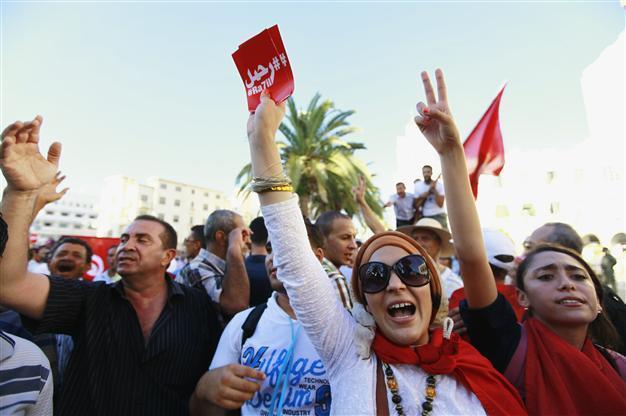Tunisia goverment resigns for new election
TUNIS

Anti-government protesters rally for the dissolution of the Islamist-led government in Sfax, 270 km southeast of Tunis September 26, 2013. REUTERS/Anis Mili
Tunisia’s Islamist-led government agreed Sept. 28 to resign after negotiations that could start next week with secular opponents to form a caretaker administration and prepare for new elections.The talks aim to end weeks of crisis involving the Islamist-led coalition government and secular opposition parties that threatened to derail the transition to democracy in the North African country where the Arab Spring uprisings began in 2011.
Tunisia’s UGTT labor union, mediating between the two sides, proposed the ruling Islamist Ennahda party agree to three weeks of negotiations, after which it would resign and make way for an independent transitional administration and set a date for parliamentary and presidential elections.
“The dialogue will start on Monday or Tuesday,” Lotfi Zitoun, an Ennahda party official, said. “Ennahda has accepted the plan without conditions to get the country out of the political crisis.” The UGTT confirmed the agreement and called on both sides to set a time to begin talks next week.
The UGTT had earlier called for a protest campaign to pressure Ennahda to fully accept its transition blueprint.
It had accused Ennahda of doing everything to ensure the failure of the road map, which it drafted along with the employers’ organization Utica, the Tunisian League for Human Rights and the bar association.
The road map sets a three-week deadline for the formation of a Cabinet of independents to replace the government, after the launch of a dialogue with opposition parties.
It also sets a four-week deadline for adopting a new electoral law, announcing a timetable for fresh elections and completing a long-delayed draft Constitution.
Since Zine El Abidine Ben Ali was ousted in 2011 after street protests against his rule, Tunisia has struggled with divisions over the political role of Islam. The opposition accuses Ennahda of imposing an Islamist agenda.
Tunisia’s path to transition, however, has been mostly peaceful compared to Egypt, where the army toppled an elected Islamist president, and Libya, where the central government is struggling to curb rival militias’ influence.
Tunisia’s political crisis erupted in July after the killing of an opposition leader by suspected Islamist militants, bringing the opposition onto the streets to demand Ennahda step down.
















